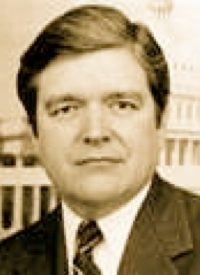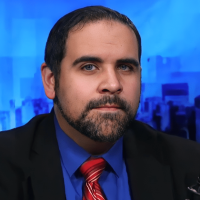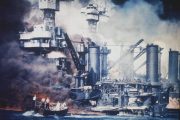
With all the excitement generated at this year’s Conservative Political Action Conference (CPAC), we at The New American thought it would be appropriate to look back at an older and earlier CPAC, when the nation’s highest-rated elected conservative member of Congress addressed the convention. It was on the morning of February 9, 1979, when Congressman Larry McDonald — who was then both a member of the National Council of The John Birch Society and a two-and-one-half term U.S. Representative from the state of Georgia — gave a speech on the threats to and importance of U.S. internal security.
Having been elected to office in 1974, a year after the first CPAC, Rep. McDonald was as new to elected office as CPAC was to the conservative movement. In addition to scoring a perfect 100 percent approval rating from the “Conservative Index” in the Review of the News (a precursor to the “Freedom Index” in The New American), McDonald also scored a perfect 100 percent in the “Key Issues Index” put out by the American Conservative Union (ACU), the parent organization that runs CPAC.
CPAC would not have been able to call itself a true conservative forum without the participation of Congressman Larry McDonald and his impeccable constitutional credentials. Likewise, for such a committed constitutionalist as Rep. McDonald, there perhaps was no better venue for him to deliver his speech to an assuredly receptive audience.
The speech, entitled “Internal Security, Terrorism and Intelligence,” was an overwhelming critique on the state of the nation’s internal security apparatus, and the severe implications brought upon by no longer having such vital tools at the disposal of the federal government in combating terrorism, espionage, and subversion.
“Quite frankly, at the present time, the potential for major terrorist incidents such as bombings, hostage taking, assassinations and kidnappings is greater now than at any time previously in our history. So is the potential for riot and civil disorder, for espionage and subversion,” McDonald warned, adding:
This situation exists for one very simple reason: the internal security apparatus of the United States has been effectively and thoroughly dismantled and our foreign intelligence agencies are floundering under merciless attacks by enemies who recommend so-called “reform” measures that would tie them hand and foot.
McDonald went on to outline what he saw as “the progress of the destruction of America’s internal security agencies over the preceding eight years:
• First, under the Nixon Administration, the Subversive Activities Control Board was allowed to starve to death by the simple expedient of not asking Congress for an appropriation. Yet the SACB was set up by an Act of Congress, a public law, the Internal Security Act of 1950, to investigate whether or not organizations were subject to Communist control and, if so, to require them to register as such…
• Second, the Attorney General’s list [of subversive organizations] itself, which had been allowed to get seriously out of date, was withdrawn…
• Third, the Internal Security Division of the Justice Department has been phased down to a minute fraction of its former strength. This has ended the training and maintenance of a group of government attorneys with the expertise to prosecute difficult and involved security and espionage cases…
• Fourth, all military intelligence investigations of civilian or off-base groups attempting to undermine morale and promote desertion, disaffection and resistance to lawful orders have been terminated…
• Fifth, in accordance with the orders of Attorney General Edward Levi and his successor, Griffin Bell, the FBI is completely out of the internal security field. As FBI Director William Webster was only too happy to tell the national meeting of the Anti-Defamation League in November, and I quote, "Any internal security program of gathering information on dissidents is gone. We are out of the business of gathering data on organizations in First Amendment activities."
• Sixth, the local and state police intelligence programs have been almost totally phased out…
• Seventh, our foreign intelligence agencies, particularly the Central Intelligence Agency and National Security Agency, have been forbidden to collect information on what is termed "U.S. persons" – that is both citizens and resident aliens – who are traveling outside the country…
• Eighth and finally, in a parliamentary maneuver the House of Representatives ended its Internal Security Committee in January 1975…
Then in 1976, the Senate abolished its Subcommittee on Internal Security, thereby stripping the nation of all its essential tools of counter-subversion. Some of the senior ranking members the Senate subcommittee were transferred to the Subcommittee on Criminal Laws and Procedures, where then-Judiciary Committee Chairman Edward Kennedy (D-Mass.) “promptly informed those internal security staffers that their services are unnecessary,” McDonald explained.
“And so, as is only too plain, there is no one in government agencies who is ‘minding the store’ and protecting internal security,” McDonald declared.
The second half of his speech was devoted to exposing Counter-Watch, a notorious leftwing revolutionary organization founded in Havana in July of 1978, and led by CIA defector Philip Agee, until his death in Cuba in 2008.
“Agee’s collaborators in Counter-Watch and its publication, the Covert Action Information Bulletin,” McDonald said, included, “two former members of the Counter-Spy magazine group, Ellen Ray and Bill Schaap, who are also active in the National Lawyers Guild, an organization cited by Congressional committees on numerous occasions as a Communist legal action front.”
“[It is d]ominated by a Havana-Moscow faction,” said McDonald of the Guild, adding that it was “the principal legal support group for terrorists in America.”
Today, the National Lawyers Guild remains very much active, with known ties to the Party for Socialism and Liberation (PSL; the political wing of the ANSWER coalition), 9/11 hijackers, and Russian international terrorist arms dealer and self-proclaimed communist Viktor Bout.
At the 2010 National Conference on Socialism hosted by the PSL, Carol Sobel of the National Lawyers Guild was presented with the “Fighter for Justice” award. In addition, Heidi Boghosian, the Executive Director of the National Lawyers Guild, was one of the invited guest speakers. Scott Fenstermaker of the National Lawyers Guild represented terrorist Ammar al-Baluchi, also known as Ali Adb al-Aziz Ali, who was found guilty and now awaits the death penalty for aiding several of the 9/11 hijackers. More recently, in 2011, Viktor Bout was represented in court by attorney Sabrina Shroff of the National Lawyers Guild.
Essentially, the National Lawyers Guild provides the legal defense for the Islamo-Communist menace in the United States.
Larry McDonald went on to reveal the connections between Counter-Watch and its predecessor Counter-Spy with the Center for National Security Studies (CNSS), of which “a large number of CNSS staff have associated with Philip Agee and with Counter-Spy,” McDonald said, as he went on to divulge specific names:
These include Morton Halperin and Jerry Berman, who have been two of the most frequent witnesses urging the enactment of the most stringent legislation restricting the CIA, NSA and other intelligence agencies basically to looking at satellite photos and reading Pravda for information. Halperin, who presents himself as something of a martyr because even Henry Kissinger thought he was a likely source for damaging national security leaks in the White House and so was subject to a national security wiretap, was credited by Counter-Spy for aiding the publication and also was a member of the Counter-Spy group’s speakers bureau.
McDonald went on to tell his audience that because information such as he gave in his speech is hardly ever reported in the mainstream print media, he recommended that if they wished “to be well informed of these subjects, read the weekly news magazine, The Review of the News and the monthly American Opinion,” both of which were later merged into The New American magazine in 1985.
He concluded his CPAC speech with a solution to these problems and as a result asked for the audience’s support:
In Congress, I have reintroduced House Resolution 48 to reconstitute the House Internal Security Committee. In the last session Congressman John Ashbrook and I were joined by a total of 176 co-sponsors. I expect to gain even more in this session. With unified citizen pressure in support of this resolution, we can get the kind of Committee to investigate the extent of the threat we face from terrorism and subversion, draft the appropriate legislation to cope with the problem, and present them to this congress.
Sponsored and introduced by Rep. McDonald on January 18, 1979, House Resolution 48, entitled “A resolution to amend the Rules of the House of Representatives to establish the Committee on Internal Security, and for other purposes,” received a total of 157 co-sponsors that year, but failed to be approved by the majority of the House. McDonald reintroduced H. Res 48 on January 28, 1981, receiving 158 co-sponsors, and reintroduced it in the following Congress on January 31, 1983, almost exactly seven months before Korean Air Lines flight 007 in which he was aboard en route from New York to Seoul, South Korea, was shot down by the Soviet Union.
Throughout his career in Congress, Larry McDonald was an unrelenting advocate of internal security, which along with his consistent 100-percent voting record with the U.S. Constitution, is perhaps his most enduring legacy in Congress and also in his speech at the 1979 CPAC.




